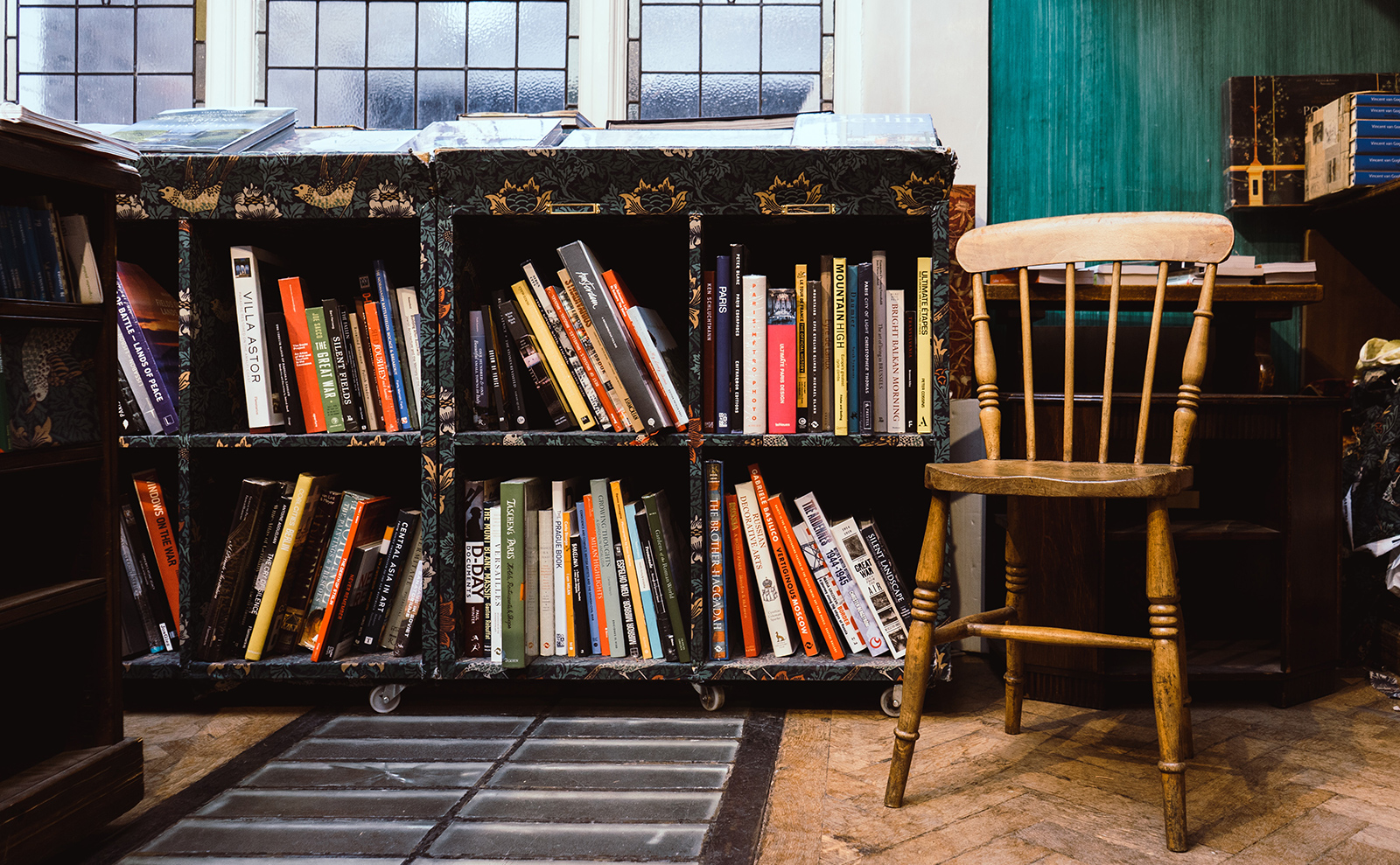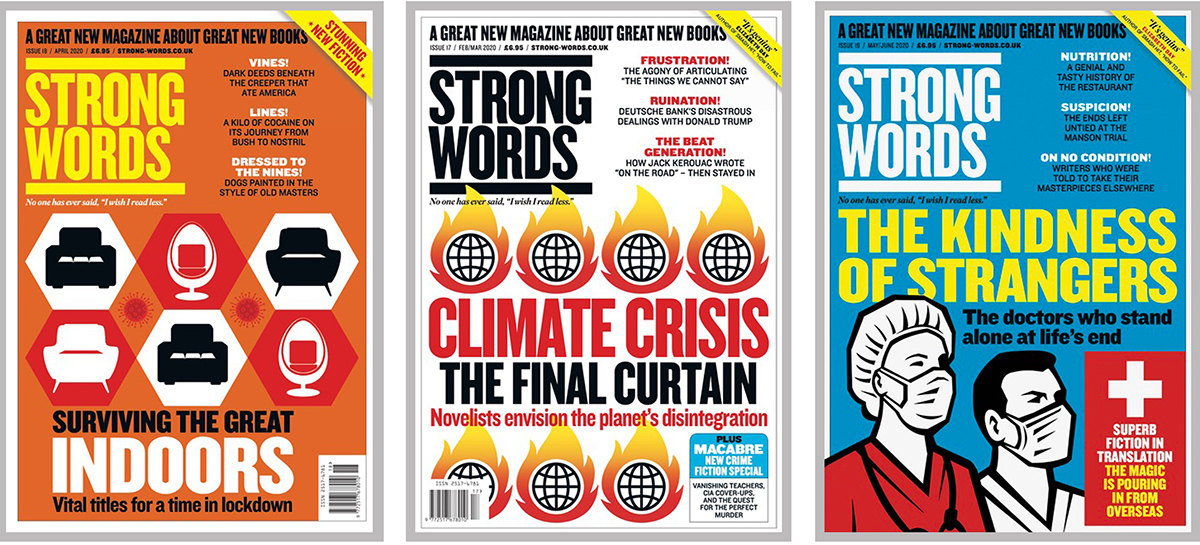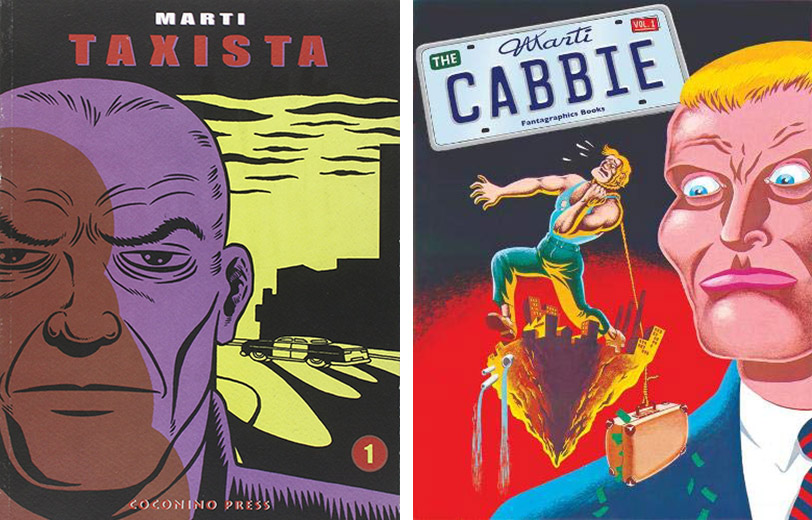
Armchair travel around the world!
Start your reading adventures with our FREE Reading Atlas.

- Around the World in 14 Books
- 7 Thrilling Book Series
- 6 Audiobooks That Are Like Theater For Your Ears



Strong Words is the magazine equivalent of that friend who reads EVERYTHING, has excellent taste, and puts only the good stuff into your hands. It’s a literary mag for people who read for pleasure and appreciate the transportive power of storytelling.

‘My goal with Strong Words,’ says editor/publisher Ed Neeham, ‘is to make my readers think, That sounds like the sort of book I would really like.’ A former editor of Maxim and Rolling Stone, Ed launched the magazine in 2018 to introduce readers to books they might have otherwise missed on their own.
Each issue is packed with more than 100 enthusiastic book reviews of both new releases and backlist titles in every genre — fiction, biography, crime and thrillers, nonfiction, cookbooks, children’s lit, graphic novels, coffee table books — as well as author interviews, gorgeous visual design, and evocative photos.
We’ve been subscribers for a year, and many of the books you’ve heard about on our podcast made it onto our reading lists via the pages of Strong Words. A new issue in our mailbox is cause for celebration around Strong Sense of Place HQ. Treat yourself and take a look inside the magazine, then subscribe, so you get the best book mail delivered to your house, too. (Gift subscriptions are also available so you can share the love.)
Since Ed writes about thousands of books each year, we knew he’d crush our challenge to apply his broad and deep knowledge to books with a strong sense of place. I suspect you’re going to add to your TBR after reading his suggestions. — Melissa

I really liked John Boyne’s A Ladder to the Sky, about an ambitious young writer who steals an older German writer’s secret experience for his own plot and in doing so utterly destroys the old man’s reputation. I’m not sure it has a particularly strong sense of place, although it starts off in West Berlin the year before the Wall came down. What it does have is a particularly strong sense of the young man’s diabolic lack of concern for anyone who gets in the way of him stealing his next great idea.
Strong Words is actually quite a portable business — I can do it anywhere there’s a reasonable internet connection — but the idea of undertaking some sort of specialist literary preparation doesn’t fit into the schedule, I’m afraid. In fact, there’s not much time to fit much holiday into the holiday as I work every day. But it’s a pleasure to do it in a warm place from time to time. I did have a lengthy travel book episode when I was younger, people like Eric Newby, Gavin Young, and Norman Lewis, but I think what I really took away from all of them was that they went to these places and spoke to complete strangers. To my introverted mind that felt like some sort of magic trick.
Sorry to be so predictable, but it has to be Dickens. The first chapter of Our Mutual Friend, the old man and a girl in a rowing boat on the filthy Thames between Southwark Bridge and London Bridge on an autumn evening, trying to make a living by fishing out dead bodies and hoping to find something in the pockets — there’s a niche profession. I’ve walked over those bridges hundreds of times at all hours of the day and night, and there’s hardly any river traffic now compared to when it was the greatest port in the world. But when the tide is on the move, you really get a sense of what a powerful and surging river it is.
I recently read a book by a pathologist who often has to autopsy bodies pulled from the river, who said the currents are so treacherous a body could follow a most illogical itinerary between going in and coming out again. I also love Pip arriving in ‘the immensity of London’ in Great Expectations and going out on his first morning while waiting for Mr. Jaggers to see the Smithfield meat market, which is still there, and St Paul’s, although its ‘great black dome’ has since been cleaned, and Newgate prison, which has gone but several of its walls are still there, and I think the Old Bailey stands where it used to or at least next door.
I also like George Orwell’s descriptions of the shabbiness of London in 1984 and Keep the Aspidistra Flying. That was a big part of my first memories of London: dirty and a little bit broken.
I love graphic novels, and they don’t get anything like the attention they deserve. With art, they can take a sense of place to whole other level, thanks to the artist’s hand. One is Chris Ware’s Jimmy Corrigan: The Smartest Kid on Earth, which is set in Chicago, but for him, it is an empty, melancholy sort of place. And it’s autobiographical – Chris Ware’s father left his family when he was very young. Then they met up again when he was an adult, but before they could have a second meeting, the father died. So all his work is imbued with this agonising stillness and awkwardness that reflects that missing relationship. It could be anywhere really, but his books are full of empty streets with nothing moving, or deserted car parks or rooftops. The effect is quite overwhelming.
The other book that deserves to be in every home is a book in Spanish called Taxista by an artist called Martí. Half of it has been translated into English, and it’s called The Cabbie, but it’s worth learning Spanish just for the experience of reading it. It’s very noir, set in some low-rent Spanish barrio, and Taxista Cuatroplazas is an upstanding member of the community who tries to bring justice to the drug dealers and kidnappers with his own arsenal. It’s great on sewers, flophouses, shanty towns, and the city at night. In fact, even in the middle of the day, it feels like three in the morning.

There are so many, and that is the kind of journalism that I really love, but the most recent one is a book called _ Inge’s War_ by Svenja O’Donnell which came out earlier this year. The author has a grandmother who she doesn’t much care for, but she knows she was born in Konigsberg in East Prussia before the war, which is now Kaliningrad and an exclave of Russia. She’s a correspondent in Moscow, so she goes to visit her ancestral city, and calls the grandmother to tell her where she is. She gradually prompts the grandmother to open up and tell the most incredible story of her personal life before the war — and how she escaped from it as a teenager with her family as the Russians approached. So the author discovers that this rather sour and grumpy old lady a) has good reason for being so, and b) has been carrying the most burdensome secrets around with her for decades. She’s really good on this lost city in a lost country, and what it’s like to flee Russians bent on revenge.
‘How to Write’ has always been about how certain novels came to be written, but I’d choose Rebecca West and ask her about Black Lamb and Grey Falcon, a book of her travels in Yugoslavia in the late thirties. It’s an absolute monster, the best part of 1200 pages of fairly dense print, but I found it a delight to read, and it made a huge impression. It’s divided into the different regions, now nations, and gives such a rich and vivid sense of each location’s sense of self, often stretching back to medieval conflicts whose embers still smolder, not to mention their own foundation myths. It also gives a sense of why the Balkans are a symbol of regional fragility, perched atop no end of fault lines: religious, historical, imperial, and just good old can’t-stand-the-neighbours. It also hints at the catastrophe and violence to come, first in the second world war, then in the collapse of Yugoslavia and war in the nineties. Quite how she extracted all that just by going there and being driven around is deserving of scientific inquiry.
I’m a great enthusiast of true crime, and my all-time favorite is Norman Lewis’ The Honoured Society, one of the first books about the Sicilian Mafia. It gives a real sense of just how poor, desiccated, and suspicious some of these villages were, and how even though Sicily is agriculturally very productive, all the peasants lived in these crumbling little towns perched on top of hills, where they could protect themselves from the bandits and their friends the shepherds, and then would go out to their miserable strips of land during the day.
One of these towns is Corleone, of which he says, ‘In this world one occasionally stumbles upon a place which, in its physical presence and the atmosphere it distills, manages somehow to match its reputation for sinister happenings.’ He then goes on to describe the ‘lugubrious back-drop of mountains the colour of lead, and its seedy houses are wound round a strange black rocky outcrop jutting up from the middle of town… for centuries the setting of a bloody routine of feuds and ambuscades… A few miles away is the famous wood of Ficuzza, a place of ghosts and legends…’ If I’m not careful, I could easily copy out the entire book.



Top image courtesy of Ugur Akdemir.
Want to keep up with our book-related adventures? Sign up for our newsletter!
Can you help us? If you like this article, share it your friends!
Strong Sense of Place is a website and podcast dedicated to literary travel and books we love. Reading good books increases empathy. Empathy is good for all of us and the amazing world we inhabit.
Strong Sense of Place is a listener-supported podcast. If you like the work we do, you can help make it happen by joining our Patreon! That'll unlock bonus content for you, too — including Mel's secret book reviews and Dave's behind-the-scenes notes for the latest Two Truths and a Lie.
Join our Substack to get our FREE newsletter with podcast updates and behind-the-scenes info — and join in fun chats about books and travel with other lovely readers.

We'll share enough detail to help you decide if a book is for you, but we'll never ruin plot twists or give away the ending.
Content on this site is ©2026 by Smudge Publishing, unless otherwise noted. Peace be with you, person who reads the small type.